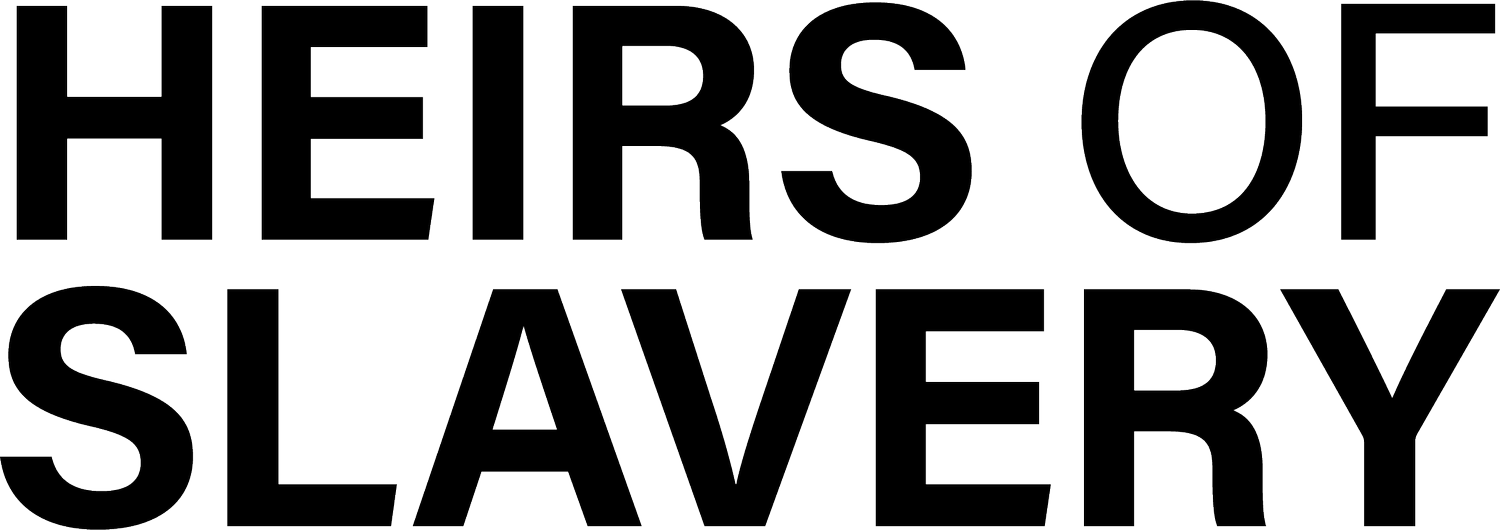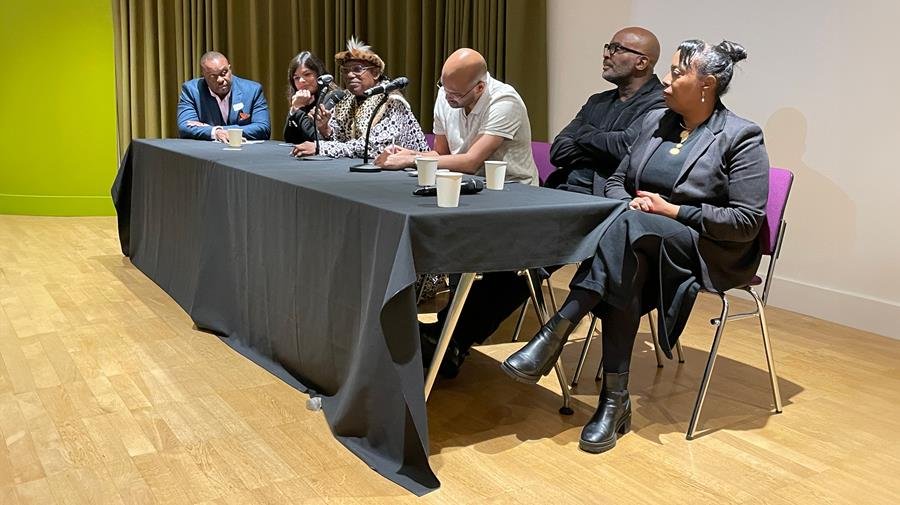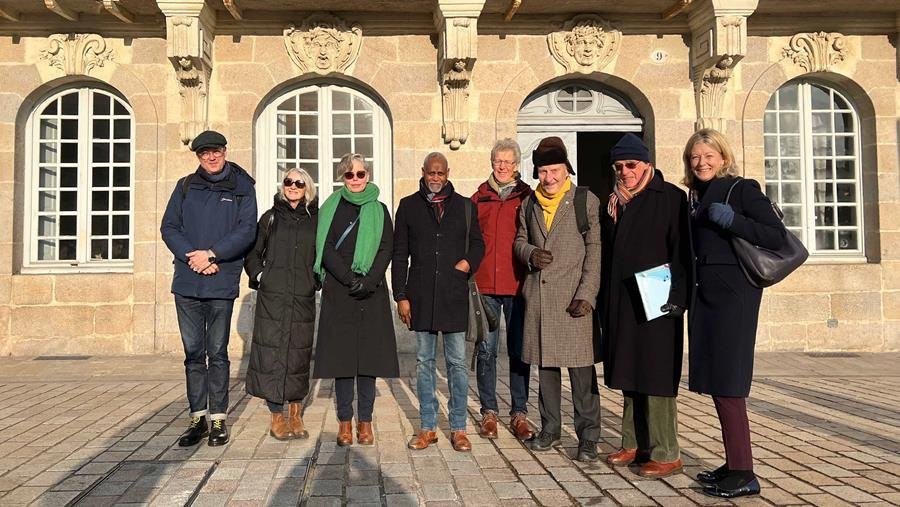Welcome to our first newsletter.
In May 2023, just eight months ago, eight of us launched Heirs of Slavery. We hoped to encourage other people to come forward – people who, like us, had discovered that their families had benefited from the wealth created by transatlantic enslavement and the industries that thrived on that. Friends and allies descended from enslaved people had told us that Britain’s tendency to deny or play down the significance of the enslavement era was still doing harm. Acknowledging that great crime against millions of African people would help in addressing the consequences that affect our society today.
What happened exceeded all our hopes. Our emergence as a group sparked worldwide media interest – on our website you can see a selection of print and and broadcast articles – and it provoked new debate about the legacies of transatlantic slavery in the UK among an audience not used to discussing such things.
More important was the reaction of those directly involved in this history. In the following months over 120 more people who have identified wealth derived from enslavement in their family history have got in touch, many of them hoping to follow that same course of acknowledgement. Hundreds more – activists, academics, teachers, artists and many people across the world who have been affected by British colonial history – have been in touch to offer their support and their approval of the Heirs’ initiative.
Some of these messages have been very moving, and we have all learnt from the stories we have been told. The geographic spread of our correspondents is extraordinary – we’ve heard from ‘heirs’ in most of the European nations that were involved in transatlantic enslavement and from people descended from both enslavers and the enslaved. People from communities affected by this history in West Africa and of course from all over the Caribbean, Canada and the United States have been in touch. It has been a humbling and inspiring time.
We’ve had some critics from among those communities and we’ve done our best to listen to the criticism and to learn. From the beginning, it has been a core principle that we should be guided by the descendants of the enslaved on what Heirs of Slavery should be. We’re still discussing that and how we evolve – how we should be constituted, where and how our efforts in support of repair and reconciliation campaigns should be directed, even what is the best name for us. If you’ve any views, please do get in touch.
As we start 2024, we hope that shifts are underway in the long process of atoning for the years of transatlantic chattel enslavement. Dare we hope that reconciliation is closer today than it was a year ago? In the next few months we’ll learn more of how CARICOM will adapt its reparations campaigning to include greater emphasis on the diaspora, on women and issues like climate change. The Church of England will announce how it will invest and spend its £100m repair fund, hopefully inspiring many other institutions to begin similar schemes.
Key for the United Kingdom, the Commonwealth and other former British colonies, we hope soon to hear the outcome of the British Royal Family’s own examination of how it benefited from enslavement – and what it is planning to do as a result. A change of government in the UK may lead to a new attitude to discussing reparations – something that the Conservative government has rejected since CARICOM first asked for talks on its plan 10 years ago.
What are your views on these issues, and on us? What do you think Heirs of Slavery should do next? We believe we should remain a loosely organised lobby group, capable of encompassing people of different views. We should concentrate on our primary purpose – encouraging and enabling other ‘heirs’ to come forward, and offering our support, if wanted, to campaigns for repair, and against racism and racial inequality. We don’t want to become a formal organisation, or a fund-raising, grant-making one – there are many of those already. We’ve held one successful ‘in real life’ conference (see below) – should we hold more? In person, or by Zoom? Do please give us your views at contactus@heirsofslavery.org.
With thanks for your interest and support,
Alex, Charlie, David, John, Laura, Richard, Robin and Rosemary
‘Heirs of Enslavement’ podcast
In September, Clive Lewis MP and Laura Trevelyan (above) co-hosted a narrative podcast called Heirs of Enslavement in which Clive, a descendant of the enslaved, and Laura, a descendant of enslavers, explore the wrongs of the past and how to right them.
In this six-part series, they travel to Grenada, Barbados, and back to London to delve into their shared history. They ask what people across the Caribbean and beyond want, how to find a way forward, and whether true reparatory justice can be achieved. You can listen or download the podcast here.
The Gladstones in Guyana
Heirs founder-member Charles Gladstone (above) and some of his family travelled to Guyana in August, to deliver an apology for their ancestor’s activities as an enslaver and plantation owner in the former colony and announce donations towards educational programmes. A journalist from the Economist reported on the trip in a podcast – ‘Can You Inherit Guilt?’ – you can listen to it here.
Online archive of enslavement
In October, Heirs founder-member Laura Trevelyan was made an honorary associate fellow at the University of the West Indies’ PJ Patterson Institute for Africa-Caribbean Advocacy. In this new role, she’s working on an idea for an online archive of records from the early period of transatlantic enslavement. 400-year-old ship manifests and plantation registers in Jamaica, Barbados and Antigua are being held in national archives where these valuable paper records are at risk from increasingly hot weather and more frequent hurricanes.
Anyone who has their own family records which could potentially be digitised and placed online as part of this project – please email Laura at mrsjamesgoldston@gmail.com. This is an important reparative project, which will give descendants of enslaved Africans in the various diasporas invaluable access to information about their ancestors. More information here.
Heirs conference in London
In November, Heirs founder-members, academics, reparations and rights activists and numerous friends and allies met at the Museum of London for our first conference.
Among the speakers were Arley Gill, chair of Grenada’s National Reparations Committee, and Jacqueline McKenzie, Head of Immigration and Civil Rights at Leigh Day Solicitors – in their session they discussed the legal challenge of getting European governments to address the reparations issue. Eric Phillips, vice-chair of the CARICOM Reparations Commission, discussed with the Gladstone family the effects of their apology to the people of Guyana, and what others in a similar situation might do.
Dr James Dawkins, a historian who works on archival records of traders and owners of enslaved people, discussed the recovery of this history and the making public of hidden stories with Catarina Demony, a Portuguese journalist and a descendant of enslavers herself. The British reparations campaigner and historian Professor Robert Beckford spoke about the history of the reparations campaigns and the role of people descended from all sides of the story in furthering the discussion today.
A visit to Jamaica
In November, founder-member Rosemary Harrison (above, right) and her daughter Joanna visited Jamaica with the purpose of confronting their ancestor's past as owner of enslaved people and enabler of the enslavement system. This is Rosemary’s account of the trip.
It was reading Kris Manjapra’s piece in the Guardian in March 2018 – ‘When will Britain face up to its crimes against humanity?’ – that first prompted me to research my ancestor Thomas Harrison. I knew he’d been Attorney General in Jamaica in the eighteenth century, and the UCL Centre for the Study of the Legacies of British Slavery database confirmed that he’d owned enslaved people. Later COVID, with its greater medical risks for those of African descent, and then the murder of George Floyd in Minneapolis, motivated me to pick up the issue of our slave-owning ancestor, and I urged my close relatives to join me in trying to redress the continuing shameful imbalance in British society by donating to the Cowrie Scholarship Foundation. It provides funding to help disadvantaged Black British students attend university.
After reading about the Trevelyan family and their apology to the people of Grenada in February 2023, I contacted John Dower. He and other members of Heirs of Slavery helped me better understand the continuing devastating effects of enslavement on the descendants of the enslaved both in the Caribbean and here in the UK.
My daughter Jo and I decided that we would visit Jamaica to deliver, in person, the Harrison family’s apology, which we’d already sent to the Jamaican National Commission on Reparations. Professor Rupert Lewis, a member of this committee, connected me with Dr Erna Brodber, a distinguished Jamaican author and an inspirational community activist. She generously invited us to stay at her home in Woodside, about 50 miles north of Kingston.
Erna took us to Woodside Ancestral Garden, in a beautiful wooded dell, which had opened in 2020 after the community won a prize to make the area accessible for edu-tourism. Here we found a memorial to the enslaved people who lived in Woodside in 1817. Erna believes that the enslaved might have met in this dell out of sight and earshot of their enslavers and overseers. It is now where the people of Woodside celebrate Emancipation with an all-night party every 1st August. As a family, we are hoping to support Erna’s work in the community with her Rural Sociology Lab / Black Space project.
In response to the Harrison family’s apology to the people of Jamaica, we had been invited to meet Mrs Laleta Davis Mattis (the Chair of the Commission) and other representatives of the National Commission on Reparations. We asked what they thought we should do on our return to the UK to support their call for repair. They explained that the history of chattel enslavement has been largely ignored in the education of Jamaican children, and that Jamaica’s government wishes for this history to be fully integrated into their school curriculum. I was proud to be able to inform them that Wales – where I live – was the first part of the UK to mandate the inclusion of Black History in its schools’ curriculum.
Mrs Davis Mattis wondered whether there was scope for an exchange of ideas between Wales and Jamaica. On my return I wrote to the Welsh First Minister about this, and the outcome is that Mrs Davis Mattis is now in contact with a Senior Policy Officer in the Welsh Government who seemed very enthusiastic about an educational partnership with Jamaica.
It’s hard to put into words our thoughts about the four days we spent in Jamaica. Uppermost in our minds was the fantastic welcome we received from all we met – kindness, willingness to tell us about their country and, above all, a tremendous sense of humour. In addition to the issues highlighted at our meeting, all around us we saw evidence of the legacies of slavery and colonisation. None of it was positive – the ‘ghettos’, the ill-health of many elderly people, fear of crime, gated homes, potholes, the need to travel long distances for work, eking out a living from selling goods along the road or from small remote patches of land, schools with little adornment, a parish orphanage…
So, in summary, our feelings are a mixture of joy, sadness, and a determination to do anything in our power as individuals – which we appreciate is extremely little – to begin to repair the effects of the crime against humanity that chattel slavery was, and which was compounded by centuries of colonisation.
Legacies of French enslavement of Africans
In November, John Dower, Laura Trevelyan and other members of the Trevelyan family were invited to the French port city of Nantes, to meet two citizens who are trying to encourage their country to recognise the present-day legacies of enslavement. Dieudonné Boutrin, who was born in the French territory of Martinique in the Caribbean, is working with Pierre Guillon de Prince, a descendant of Nantes shipping merchants involved in the transatlantic trade in enslaved people. Together, they plan to visit Martinique in 2024 to encourage a debate about the legacies of French colonialism and enslavement.
Following his visit to Nantes, John Dower has been reaching out to organisations and leaders in Bristol, London and Liverpool to explore the possibility of setting up an alliance of collaboration with the French port around reparative justice and the recognition of the part these cities played in transatlantic enslavement.
You can find out more about Dieudonné and Pierre in this article published in Télérama magazine, here.
Harewood’s Missing Portraits
January sees the return of Harewood’s Missing Portraits with ‘David Harewood: What’s in a name?’ The exhibition celebrates the life of the actor and activist David Harewood OBE, whose ancestors were enslaved on Lascelles family plantations in Barbados.
Harewood House contains many portraits, all of them representing rich white people, many of them called Lascelles. Missing Portraits seeks to redress this imbalance by commissioning photographic portraits of contemporary men and women of Caribbean descent with a connection to Harewood today. David Harewood said of his portrait (in the Guardian): ‘It stands as a fine example of the resilience of my people; that not only did we endure and survive, but we have also managed to thrive.’
The exhibition runs from 19 January to 3 March 2024, after which David’s portrait by Ashley Karrell will become part of Harewood’s permanent collection.
For more information visit the Harewood House website.
A round-up of some more of our recent activities...
• In June, John Dower and Laura Trevelyan spoke about their family’s connection with transatlantic enslavement to all the students at Trevelyan Middle School in Windsor, which had been named after and opened by their forebear Charles Philips Trevelyan in 1931.
• In July, John Dower, Alex Renton and David Lascelles met ten representatives of the UK Reparations campaign at Leigh Day solicitors, facilitated by human rights lawyer Jacqueline McKenzie, to hear how Heirs of Slavery might offer allyship.
• In July, John Dower, Laura Trevelyan, Tom Trevelyan and Alex Renton were all featured in a series of articles written by Oliver Pascal-Mousselard for Télérama magazine in France. The debate is at an earlier stage there and given France’s constitution, it is harder to fight for reparative justice there, but it was the beginning of a relationship that is developing with colleagues in Nantes (see above).
• In August, John Dower was invited to speak at African Remembrance Day in London – the first white person to make an address since the event started twenty-eight years ago – and was invited along with Alex Renton to join the panel at the 17th RMT Union Reparations Conference in London.
• In September, Richard Atkinson addressed the Association of Genealogists and Researchers in Archives (AGRA) at their third conference held at Downing College, Cambridge. Subsequently he gave an online talk to the Society of Genealogists, ‘Mr Atkinson’s Rum Contract: Confronting a family’s slave-owning past’.
• In October, John Dower was invited by Bell Ribeiro-Addy MP to speak on the ‘Heirs and Allies’ panel at the London Reparations Conference. He also joined the panel of two meetings for Remember the 400, a youth advocacy group based in North America.
• In November, Alex Renton and John Dower spoke on a panel with Professor Robert Beckford on the theme of ‘Reparations – About Time’ with White Allies Network.
• In December, in her new role as a PJ Patterson fellow, Laura Trevelyan was invited to join the 1619 Project’s Nikole Hannah-Jones at the United Nations’ HQ in New York for a UNESCO panel on the transatlantic slave trade called ‘Knowledge, History and Power’. More on this event here.
Looking forwards...
• John Dower will speak at the ZAG conference in Edinburgh in February 2024 on the theme of ‘generosity in a time of greed’.
• John Dower and other Trevelyan descendants are in discussions with the National Trust with the eventual aim of some kind of exhibit to recognise the family history of plantation ownership at Wallington Hall in Northumberland. There is a similar aim at Nettlecombe House in Somerset.
• Alex Renton has been serving as a member of the Church Commissioner's Oversight Group working on the design and guiding principles of the £100m perpetual fund being set up by the Church of England to address its responsibility to the descendants of enslaved people. The report will be issued in March.
• John Dower has been speaking with Lavinya Stennet at the education advocacy and support group Black Curriculum about how Heirs of Slavery can support their aims.
• Alex Renton has taken part in a series of events and discussions at universities and secondary schools with students studying the history of transatlantic enslavement, the wealth that accrued in Britain and the ideas behind Heirs of Slavery, and the value of acknowledging this history. Please get in touch if a talk or a debate would be of interest at your institution during 2024.
Notice board...
The documentary maker Tamara Gordon asks whether any ‘heirs’ would be interested in being involved in a film she’s making following people’s journeys of acknowledgement and possible atonement. She can be reached at tamaragordonfilms@gmail.com
And finally, we've changed our email...
So if you would like to respond to this newsletter or continue conversations already underway – please use contactus@heirsofslavery.org






